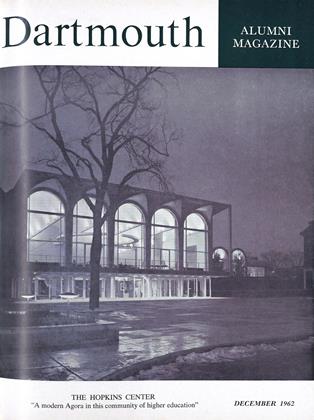JUST what kind of daredevil is going to stand up and open his mouth in brazen comment when he is a guest of the College, in the guise of a class officer, has been wined and dined to the point of salubrious contentment, generously briefed by a panel of outstanding professors, and then asked, "Are there any questions or comment?" The invitation was sincere, and courageous too, for the presiding officer must have known how some of our vocative grads are fond of sounding off when given the least encouragement. This happened late Friday evening of the 1962 Class Officers Weekend in Hanover. No daredevil was present. The meeting adjourned.
I was seated in the north balcony of "Old Dartmouth Hall," where the sophomores rallied during the riotous college meetings of our time and bombarded the freshmen, in the south gallery, with epithets and prenuclear missiles. Did I have a question? It was a temptation, but I resisted my sophomoric impulse and postponed the discussion.
My question was probably in the minds of many who listened to the panel bring us up to date on the improvement in the quality of the students now being admitted to Dartmouth. Their definition of high quality was clearly synonymous with straight-A scholarship records in prep school. We were told that one lad admitted recently was so straight-A-ish that he was placed in the sophomore class. This was impressive to some of us lunkheads who were admitted with mediocre records by college officers who must have worn rose-colored glasses. We now look back with sympathy and gratitude to one or more professors who soon discovered we were not honor grade in all fields! How happy would be the future faculties of Dartmouth when facing in their classrooms and research laboratories none but A students.
How would this dream check with the main purpose of the College as taught to Dartmouth alumni by all administrations from Wheelock to Dickey? At the beginning there was "A voice crying in the wilderness." Today President Dickey phrases the purpose concisely: to produce men of "competence and conscience President Tucker defined it clearly: "We are set to the task of taking the average product of a democracy, of qualifying as much of it as possible for independent scholarship, of moulding as much of it as possible into the habit of the gentleman, and by fitting it all by all the means and incentives at command for the high estate of influential citizenship."
For the high estate of influential citizenship.
Are we improving the quality of our entering freshmen by giving preference to the straight-A applicant over the wellrounded lad who may have scored only one A in his senior year at high school? That is the question which I postponed on the evening of May 4th.
But I have no intention of trying to prove by discussion that my answer-in favor of the applicant who has the best potential for future influential citizenship - should be given priority. Rather I am hereby submitting a request for a thorough research under modern science ground rules. Members of the faculty who are granted one-year fellowships might consider this as a mission. It would curtail the constant debating among our alumni in which they make assertions based on limited knowledge. A thorough research would give us the facts.
For example: (A) Our researcher might start by preparing a scoring sheet on influential citizenship. What should a man do in his local community, or in the national or international field, to prove that he is a good investment for Dartmouth? That will require deep study, objective analysis, much travel, and many interviews. (B) flow much time should be allowed after graduation? Ten, fifteen, twenty years? Perhaps a spread of ten years - say from fifteen to twenty-five years out of college. (C) Then our researcher can go to the records of the chosen period, find out who entered from secondary school with all A's, and rate them on his scoring sheet. (D) This would prepare the way for selecting an equal number of well-rounded entrants from the same classes, rating them, and making a comparison of the two groups.
This request is submitted respectfully by one who has no claim to knowing the exact definition of quality as applied to 18-year-old boys, but who has spent 35 years trying to prepare them for entrance to Dartmouth and other colleges.
Huston Lillard, bequest chairman for1905, is the retired headmaster of TaborAcademy. He played end on the 1903Dartmouth football team that christenedthe Harvard Stadium.
W. HUSTON LILLARD '05
Article
-
 Article
ArticleFACULTY NOTES
January 1916 -
 Article
ArticleDARTMOUTH WINS AND LOSES IN DEBATE
June 1921 -
 Article
ArticleTuck School Contributors
December 1960 -
 Article
ArticleThe 213th Beginning
OCTOBER 1982 -
 Article
ArticleBergen County
OCTOBER 1962 By DONALD SISSON ’45, Gilbert G. Sykes -
 Article
ArticleHunting Out West
May 1939 By GILBERT E. STOKES '40









